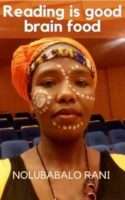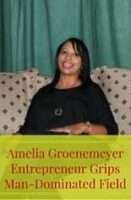“Apart from it being good brain food, reading can change your life,” says 40-year-old Nolubabalo Rani from Qamata in Eastern Cape who now stays at Lower Cross Roads. Nolubabalo runs a reading group for children in her neighbourhood. She’s been volunteering in her spare time to try to instil a reading culture within those young people.
“My grandfather used to tell me that a home is not a house, but instead, it is any place of someone’s happiness, and I’ve always found happiness in a book.”
Nolubabalo says that reading has always been her way of escaping bad situations. She is grateful to her grandfather who would always gather old books for her to read at home; that’s why she’s always been a big reader. This helped her to rise above own her situation to become an inspiration to other people from similar backgrounds.
“I grew up without knowing my father and the whereabouts of my two other siblings. It was not as sad as it sounds for me, thanks to both the overwhelming presence of my grandfather and to reading which kept my mind always busy.”
Reading didn’t only help her beyond her home situation but also beyond social problems. “I was even bullied at school by other kids, but that changed when I got into stories and started telling them to people.” Nolubabalo says her entire life was changed when she started finding solace in books, which is how she became a good storyteller. “I developed a culture of storytelling which even helped to gain a lot of new friends because I would twist situations to make people happy, and people liked me..”
In 2011 she started a reading club in her community and the difference it has made to the lives of young people has been amazing. At her club she instils her passion for reading in young people. She says she would always see the difference in young people who attended reading clubs.
“It was always children who were different and who kept their priorities. They would just look different even at first impressions. These are the kind of people that made me realise that there is a lot of hope in young people who only need to be taught the right things.”
“I discovered that I could use my talents for storytelling in positive ways with the children who are so into reading!” says a proud Nolubabalo who hopes to build good story tellers out of them.
“There are many talents in the township and we need to grow and nurture them ourselves otherwise they will get lost.” Their reading club focuses on children between the ages of three and fourteen. According to Nolubabalo, these are perfect ages because she believes in instilling positive attributes while children are still young and excited. She believes that reading can be a very powerful tool for kids who come from underprivileged backgrounds like herself.
She has discovered that schools nowadays also fail at developing young people personally, which is why there is so much need for extra spaces where children can use language constructively. “In our reading groups, we have discussions at the end of each reading session where the children share their views and thoughts; this is good for them because it encourages boldness.”
“Schools are not so good at orals anymore like in the old days, they focus so much on writing which is also good, but children also need to know that talking is good too and there’s a certain art to it,” she says.
“We try to teach children to enjoy reading because it will open up their minds.”
Nolubabalo says it’s through reading that she could always imagine herself out of her situation. It is this understanding that she knows the power of reading books because everything begins with a dream. “Books offer a lot of guidance and advice,” she says.
She is aware of a very common stereotype that ‘black people don’t read’, and this is one thing she is committed to fighting. She mentions a common quote, ‘If you want to hide anything from a black person, do it in a book.’
She says it’s all thanks to reading that even at 40 years she has managed to get to university and to do what she loves. She managed to get distinctions in her first semester. She encourages people to practice what they preach and demonstrate the example of what they would like to see in their work.
“Young people must know that their backgrounds are not important, they must just focus on what it is they want and if they do that they will get everything they want,” says Nolubabalo.





